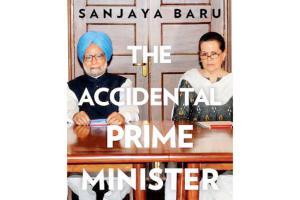Yup, finally watched The Accidental Prime Minister, based on Sanjaya Baru's eponymous book: because, how can you not?

 I couldn't quite spot my favourite passage while speed re-reading Sanjaya Baru's The Accidental Prime Minister: The Making And Unmaking of Manmohan Singh, but roughly remember it being about the former PM, while he was still a high-level bureaucrat.
I couldn't quite spot my favourite passage while speed re-reading Sanjaya Baru's The Accidental Prime Minister: The Making And Unmaking of Manmohan Singh, but roughly remember it being about the former PM, while he was still a high-level bureaucrat.
He had a friend visiting him in office. On his way out, the friend asked if Dr Singh's car could drop him to a certain point. Could it rather not, Dr Singh gently whispered, since he had an "official" car, which could be used for no other purpose!
The other one (again I couldn't spot the exact para) is when Baru visits the PM at his home on an evening, and finds him and his wife on either corner of the living room sofa, quietly, devotedly reading a book for effective recreation. Even if it sounds lame, it tells a lot about India's last intellectual Prime Minister, who whether accidental or not, finished a full decade, when the press, during his first term helming a shaky coalition, gave him a few months, tops.
That from a list of unscrupulous, 'professional' PM aspirants, Sonia Gandhi, chief of a rainbow coalition, picked Dr Singh for the job, ought to be compared against the morally upright, Mensa champions the current ruling party has chosen to lead states they've won at Assembly elections since they came to power.
Be that as it may, Baru's 2014 book hardly sheds as much light on India's politics as it does on the Prime Minister's Office (PMO), classified for general public, and where he served as media adviser. For once, unlike all his immeasurably discreet predecessors, inevitably loyal to their masters, Baru gratefully did what fine journalists tend to do: write about what they see/know.
How much did Baru see/know? He outrageously over-estimated his influence/access-one recalls this being the official response from Dr Singh's family to Baru's breezy tell-all. Either way, what did we learn/get from the precious non-fiction?
An incredible inside view of turf wars between ministers-junior, senior, cabinet-the hierarchies that determine the ascent to Raisina Hill, which houses the holy grail: the external affairs, home, finance, and defence minister/ministry, apart from the sanctum sanctorum, the PMO.
Furthermore, the pettiness for the corner office even within the PMO, that essentially comprises chosen mix of technocrats, politicians, bureaucrats (in Baru's case, journalist), whose paths at various points-sometimes school/college, besides socially/ professionally-have crossed through their working life, making power seem more comfortably wrested at the gated India International Centre than an open, democratic playfield.
This part of the book easily lends itself into a British-style series like Yes, Prime Minister, with reportage, all in there. But a closer approximation to the inner workings of South and North Block might well be West Wing, which made Aaron Sorkin the star-writer; and which as boss-director David Fincher, despite the same setting, created a whole new "portraiture of chaos" for, in House Of Cards.
Baru's The Accidental Prime Minster has been turned into a feature film, which I finally saw last night; because, how can you not? To be fair, no film, however vastly different from your expectations-whether Gandhi (1982), Gunda (1998), or Gandu (2010)- is as f*** all as it's made out to be; likewise, the reverse. Each finds its own audience, and none is meant for no one.
The film version of Baru's rare bestseller, directed by first-timer Vijay Ratnakar Gutte, primarily focuses on supposedly established opinions-on what a control-freak Sonia Gandhi was, or what a Pappu her son Rahul Gandhi is among, I guess, a sea of the highly learned, unbendingly ethical Opposition, and his party folk, you know. It turns a robust insider's account into a completely distant outsider's take.
Sure, as a result, one gets the sense that the filmmakers have done an RGV (Ram Gopal Varma) on the material, which is the heroic act of hastily delving on a superb subject (26/11, Neeraj Grover murder, etc), hence closing off the possibility for others to dissect it much better.
It's not so significant still whether you consider The Accidental Prime Minister-that gets away with so much-as a pure propaganda film, suitable to the current government. Or a proper-ganja film (unlike the book)-given a wonderfully styled, but croaky voiced PM, waddling like a penguin; sober wooden interiors of the PMO looking like a cheap shaadi hall; background score sounding like Kal Ho Naa Ho; Baru as the dapper dude in blue suede shoes…
What can't be denied is how the film name, names; and everyone from the periphery to the centre-from AK Antony to Arun Shourie, Ahmed Patel to Advani-has a face to it. Finally a precedent has been set (to be followed, bindaas) in a country, obsessed with politics as gossip/entertainment, with hardly any examples merging the two.
As for the story, based on top-class publicity, and God-like promises, what followed Dr Singh's exit was the historic, hegemonic ascent of Prime Minister Narendra Modi. Whether that was an accidental surge, of course, we will only know in few months.
Mayank Shekhar attempts to make sense of mass culture. He tweets @mayankw14 Send your feedback to mailbag@mid-day.com
Catch up on all the latest Mumbai news, crime news, current affairs, and also a complete guide on Mumbai from food to things to do and events across the city here. Also download the new mid-day Android and iOS apps to get latest updates
 Subscribe today by clicking the link and stay updated with the latest news!" Click here!
Subscribe today by clicking the link and stay updated with the latest news!" Click here!







